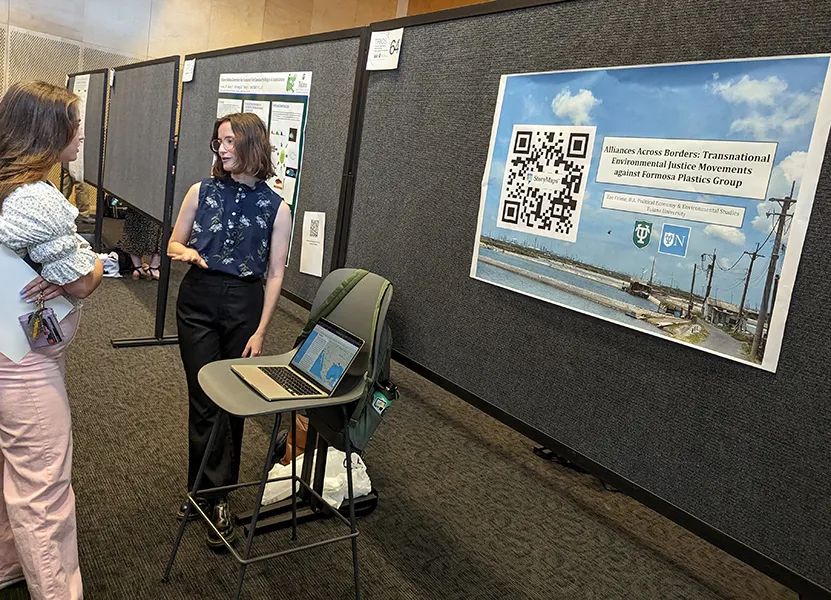
From Economics to Anthropology, female Beatniks to Aristotle, students and faculty participating in this year’s Tulane Research, Innovation, and Creativity Summit proved that research in the Liberal Arts is vital, dynamic, and full of possibilities.
Held at the Lavin-Bernick Center for University Life (LBC) from April 23-25, and sponsored by the Tulane Innovation Institute and the Office of The Vice President for Research, the annual event aims to showcase the “breadth and depth of research, innovation, and creativity from disciplines, departments, units, and schools across Tulane University.” Along with TRICS panels, lectures, and special workshops, students were invited to participate in poster sessions, a chance to present and engage with the public on their projects and findings.
Over three days, 16 students from the School of Liberal Arts, representing the Departments of English, Economics, Philosophy, Anthropology, and Environmental Science, joined in on the poster sessions, standing alongside those from Tropical Medicine, Biomedical Engineering, Architecture, and other schools. Undergraduate Hannah Rubenstein explained her theories on “How to Build a Better Male Lead in K-Dramas,” while Philosophy graduate student Samuel Hage broke down Species Essentialism in Aristotle. Presentations, of course, were not always limited to their posters: as part of her honors thesis, Undergraduate Zoe Friese created an interactive map tracing the global movements of environmental activists against the Formosa Plastic Group. Her poster included a QR code linking to her interactive site. Another intriguing project, by Economics PhD Candidates Barb Lundebjerg and Yu Liu, with Associate Professor of Economics Patrick Button, was an audit field experiment designed to quantify discrimination on the basis of race, ethnicity, gender, gender identity, and health insurance status (and their intersections) in requests for talk therapy appointments with licensed therapists.
At the faculty panel, titled "Local to Global: Today’s Research, Scholarship, and Creativity Across Tulane Liberal Arts," colleagues across disciplines had a chance to share and celebrate research achievements and future prospects. A few key presentations included Marcello Canuto's large-scale modeling of the ancient lowland Maya, Allison Emmerson's excavation of marginalized areas in Pompeii, and Laura-Zoë Humphreys' study on media piracy in Cuba. Other topics covered behavior patterns of wild Capuchin Monkeys, race, ethnicity, and health insurance discrimination in access to mental healthcare, food system leadership, the economics of Mardi Gras, and the connections between global port cities.
Organized by Kathy Jack, Associate Dean for Research and Graduate Programs, with help from Dean Brian Edwards, the presentations fit naturally under each of the School’s four pillars of distinction — strategies that emphasize the school’s global citizenship, its commitment to research through a liberal arts approach, a local focus on New Orleans and Gulf South, and duty to educate the next generation of leaders for careers in the future.
From students to faculty, TRICS was an exciting opportunity to spotlight the liberal arts community at large, its values, and its diversity. The wide range of projects emphasized the role of liberal arts research in addressing complex societal issues, and in moving beyond theoretical inquiry to have practical implications and real-world impact.

